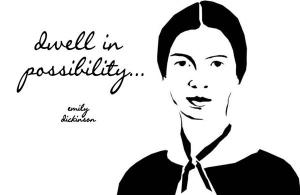April is National Poetry Month. Is there any other art form that performs an aria with fewer notes than poetry? I came to poetry long after my school days were over, well into adulthood. What the dead, white poets hadn't done for me, hot-blooded mamas like Lucille Clifton, Mary Oliver, Anna Swir, and Sharon Olds did. I happened to say as much to a good friend of mine, who confessed she never had developed a passion for verse. Thus began our six-month collaboration to find and publish a collection of poems in braille—adopting Emily Dickinson’s visceral definition: “When I feel physically as if the top of my head were taken off, I know that is poetry.”
I’m not sure Emily would have approved of every poem; some are clearly erotic. We chose not to censor in braille what is not forbidden in print. On the other hand, we didn't want the collection to become a middle-school graduation gift, so we added the tagline: “This is not your grandmother’s poetry.” Not everyone got the hint. One very polite caller left a sweet message on my machine, confessing to being somewhat old-fashioned, and, after much hemming and hawing, suggested we prepare the reader more explicitly.
Although sales for The Poetry of Everyday Life have been modest, those who gave in to the temptation are glad they did. Wrote John from St. Louis, “For me, these poems are what poetry should be… about life as it is lived and experienced by real people like me, but expressed in ways I could never come up with. They are not simple and sentimental. They are about our lives.” Nancy from Easton, PA, who reads from the collection at poetry gatherings, claims “reading Mary Oliver’s Wild Geese in braille is worth the price of the entire book—those last few lines…"
Whoever you are, no matter how lonely,
the world offers itself to your imagination,
calls to you like the wild geese, harsh and exciting—
over and over announcing your place
in the family of things.

